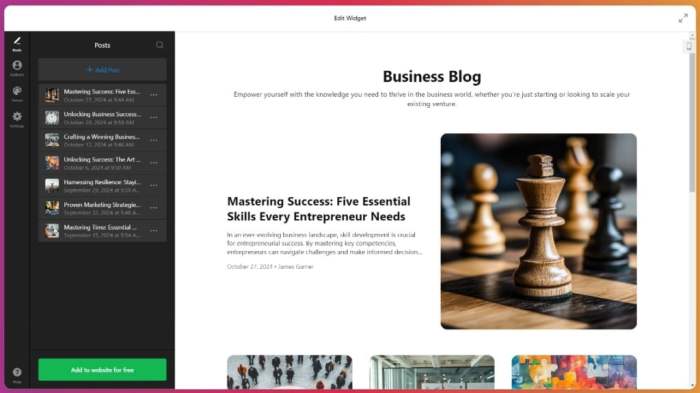How to Start a Blog: Ready to dive into the exciting world of blogging? Whether you’re passionate about sharing your thoughts or looking to start a business, this guide will take you through the essential steps to launch your own blog and make it stand out in the digital landscape.
Introduction to Blogging

A blog is a regularly updated website or web page where an individual or a group of people share their thoughts, opinions, and experiences on a particular topic.
Starting a blog can serve various purposes, such as expressing creativity, sharing knowledge, building a personal brand, connecting with like-minded individuals, and even generating income.
Benefits of Having a Blog
- Enhances Writing Skills: Blogging regularly can help improve writing skills, creativity, and communication abilities.
- Builds Online Presence: Having a blog can establish your online presence and credibility in your niche.
- Opportunity for Monetization: Successful blogs can generate income through advertisements, sponsored content, affiliate marketing, and selling digital products.
- Networking and Community Building: Blogging allows you to connect with a community of readers who share similar interests, fostering relationships and collaborations.
- Personal Development: Blogging can be a journey of self-discovery, personal growth, and learning new skills related to content creation, marketing, and web design.
Choosing a Blogging Platform
When it comes to starting a blog, one of the crucial decisions you’ll need to make is choosing the right platform. The platform you choose will impact your blog’s design, functionality, and overall success. Let’s compare some popular options like WordPress, Blogger, and Medium to help you make an informed choice.
WordPress
WordPress is one of the most popular blogging platforms, known for its flexibility and customization options. It offers a wide range of themes and plugins to enhance your blog’s appearance and functionality. Many professional bloggers and businesses prefer WordPress for its scalability and capabilities.
Blogger
Blogger, owned by Google, is a free and easy-to-use platform ideal for beginners. It offers a simple interface and seamless integration with Google services. While Blogger may lack some advanced features compared to WordPress, it is a great option for hobby bloggers and personal websites.
Medium
Medium is a unique platform that focuses on quality content and community engagement. It is known for its clean design and user-friendly interface. Medium is a great choice for writers looking to reach a wider audience and connect with like-minded individuals.
Factors to Consider
– Ease of use: Consider your technical skills and choose a platform that aligns with your comfort level.
– Customization: Determine how much control you want over your blog’s design and features.
– Scalability: Think about your long-term goals and whether the platform can grow with your blog.
– Community: Consider the audience and engagement opportunities each platform offers.
Popular Blogs on Various Platforms
– WordPress: The Blonde Abroad, Smitten Kitchen, TechCrunch
– Blogger: Cupcakes and Cashmere, The Pioneer Woman, Design Love Fest
– Medium: Better Humans, The Startup, Forge
Make sure to assess your needs and goals before selecting a blogging platform that best suits your style and objectives.
Selecting a Niche for Your Blog
When starting a blog, choosing the right niche is crucial for your success. A niche is a specific topic or area of interest that your blog will focus on. Selecting a niche helps you target a specific audience, establish yourself as an expert in that area, and ultimately grow your blog’s readership and following.
Importance of Choosing a Niche
Choosing a niche is important because it allows you to:
- Build a targeted audience: By focusing on a specific niche, you can attract readers who are genuinely interested in your content.
- Establish authority: Specializing in a particular niche helps you become an expert in that area, gaining credibility and trust from your audience.
- Monetize your blog: A well-defined niche makes it easier to monetize your blog through partnerships, sponsorships, and affiliate marketing.
Finding a Niche You Are Passionate About
To find a niche you are passionate about, consider the following tips:
- Identify your interests and hobbies: Start by making a list of topics you enjoy and are knowledgeable about.
- Consider your expertise: Think about your skills, experience, and expertise in a particular area that you can share with others.
- Research trending topics: Look for popular trends and topics within your areas of interest to see what people are currently engaging with.
Researching and Validating a Profitable Niche
Researching and validating a profitable niche involves:
- Conducting market research: Analyze the demand and competition within your chosen niche to determine if it is profitable.
- Testing your niche: Start by creating some content around your niche and see how your audience responds to it.
- Exploring monetization options: Look into different ways you can monetize your blog within your chosen niche, such as sponsored content, ads, or selling products/services.
Setting Up Your Blog
Setting up your blog is an exciting step towards sharing your thoughts and ideas with the world. It involves selecting a domain name, choosing a hosting service, and designing your blog to make it visually appealing.
Selecting a Domain Name
When choosing a domain name for your blog, make sure it is unique, easy to remember, and relevant to your niche. Consider using your name or a catchy phrase that reflects the content you will be sharing. Avoid using numbers or special characters that can confuse your audience.
Choosing a Hosting Service
Selecting a reliable hosting service is crucial for the performance and security of your blog. Look for a hosting provider that offers good uptime, fast loading speeds, and excellent customer support. Consider factors like pricing, storage space, and scalability when making your decision.
Designing a Visually Appealing Blog
To design a visually appealing blog, choose a clean and user-friendly layout that complements your content. Use a color scheme that is easy on the eyes and reflects your brand. Incorporate high-quality images and graphics to make your blog visually engaging. Consider the use of white space to improve readability and navigation for your readers.
Creating Quality Content
Creating quality content is essential for the success of your blog. Engaging your audience with valuable and interesting posts will keep them coming back for more. Here are some tips for generating high-quality content:
Types of Content
- Articles: Well-written blog posts that provide valuable information to your readers.
- Videos: Visual content that can be entertaining, educational, or a combination of both.
- Infographics: Visual representations of information that are easy to digest and share.
Importance of
, or search engine optimization, plays a crucial role in creating content that is easily discoverable by search engines. By incorporating relevant s, meta descriptions, and quality backlinks, you can improve your blog’s visibility and attract more organic traffic.
Promoting Your Blog
Promoting your blog is essential to attract readers and build a loyal audience. Utilizing various marketing strategies can help increase visibility and engagement for your blog. Social media marketing and email marketing are two powerful tools that can be used to promote your blog effectively.
Social Media Marketing
Social media platforms such as Instagram, Facebook, Twitter, and Pinterest can be great channels to promote your blog. Here are some tips for utilizing social media for blog promotion:
- Share your blog posts regularly on your social media profiles.
- Engage with your followers by responding to comments and messages.
- Utilize hashtags relevant to your blog niche to reach a wider audience.
- Collaborate with influencers or other bloggers for cross-promotion.
Email Marketing
Email marketing is another effective way to promote your blog and connect with your audience. Here are some tips for building an email list and using email marketing for blog promotion:
- Create a lead magnet or freebie to entice visitors to subscribe to your email list.
- Send out regular newsletters with updates, blog posts, and exclusive content to your subscribers.
- Personalize your emails to make them more engaging and relevant to your audience.
- Segment your email list based on interests or behaviors to send targeted content.
Building an Audience
Building an audience for your blog takes time and consistency. Here are some tips to help you grow your blog’s readership:
- Produce high-quality, valuable content that resonates with your target audience.
- Engage with your readers through comments, social media, and email to build relationships.
- Promote your blog through guest posting on other blogs or websites in your niche.
- Utilize strategies to improve your blog’s visibility in search engine results.
Monetizing Your Blog: How To Start A Blog

When it comes to monetizing your blog, there are several methods you can explore to start earning money from your content. Let’s dive into some popular ways bloggers make money from their blogs.
Affiliate Marketing
Affiliate marketing is a popular monetization strategy where bloggers promote products or services of other companies and earn a commission for each sale or lead generated through their unique affiliate link. Here’s how it works:
- Join affiliate programs relevant to your blog niche.
- Write reviews or create content around the affiliate products/services.
- Include affiliate links in your content and encourage readers to make a purchase.
- Earn a commission for every successful referral through your affiliate links.
Sponsored Posts, How to Start a Blog
Sponsored posts involve partnering with brands or companies to create content that promotes their products or services. Bloggers are typically paid a fee for writing and publishing sponsored posts on their blogs. Here’s how you can monetize through sponsored posts:
- Build a strong and engaging blog with a loyal audience.
- Reach out to brands or companies relevant to your niche for sponsorship opportunities.
- Create high-quality sponsored content that aligns with your brand and the sponsor’s goals.
- Disclose sponsored content clearly to maintain transparency with your audience.
Selling Products/Services
Another way to monetize your blog is by selling your products or services directly to your audience. This can include digital products like e-books, online courses, or physical products related to your blog niche. Here’s how you can start selling products/services on your blog:
- Identify a product or service that adds value to your audience.
- Create a sales page or product listing on your blog.
- Promote your products/services through blog posts, email marketing, and social media.
- Provide excellent customer service to build trust and loyalty with your customers.
Successful Bloggers Monetizing Their Blogs
Many bloggers have successfully monetized their blogs and turned them into profitable businesses. Some examples of successful bloggers who have effectively monetized their blogs include:
1. Pat Flynn from Smart Passive Income
2. Michelle Schroeder-Gardner from Making Sense of Cents
3. Lindsay and Bjork Ostrom from Pinch of Yum
4. Rosemarie Groner from The Busy Budgeter
5. Darren Rowse from ProBlogger